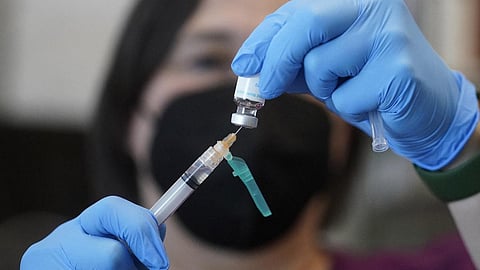

HYDERABAD: Over the last decade, researchers have been working on developing messenger RNA (mRNA) vaccines but the technology was only popularised internationally during the pandemic and now mRNA vaccines are among the leading immunisation technologies.
Moderna, Pfizer, BioNtech have pioneered in manufacturing mRNA vaccines globally, however, in India, the first indigenous mRNA vaccine technology for Covid-19 devoid of any technological contributions from elsewhere was developed by a team from the Atal Incubation Centre-CCMB (AIC-CCMB).
Unlike Covishield which uses harmless viruses combined with SARS-CoV-2 proteins or Covaxin which uses a neutralised virus that cannot replicate, the mRNA vaccine uses the genetic code of the virus. When vaccinated, it produces proteins inside the body thus eliciting a protective immune response. While these vaccines are known to be efficient up to 80-85%, these mRNA vaccines have been given a specificity above 90% said, the CEO of AIC-CCMB, Dr Madhusudhana Rao on Wednesday.
Speaking on technical advantages, Dr Rao said these vaccines do not need very large spaces to manufacture. “For example, the Serum Institute of India which makes Covishield or Bharat Biotech which makes Covaxin require huge facilities and equipment to grow the viruses and have to place massive safety protocols and quality control measures as the viruses are live and in turn, all of it adds to the selling price of the vaccine. But for mRNA vaccines, the problems are much smaller and can be made available at lesser costs at a faster pace,” he said.
Elaborating on storage of the vaccine, he said that the vaccines developed by Moderna and Pfizer are required to be stored at - 80 degrees celsius. “Pune-based Gennova Bio developed an mRNA vaccine which, according to them, is stable at 4-degree celsius. Such vaccines are more useful in countries like India which cannot maintain a cold chain of - 80-degree centigrade in remote places,” he said. Speaking about the biological safety of mRNA vaccines, he said that such vaccines do not have the ability to integrate and cause illness.
Dr Madhusudhana Rao added that mRNA vaccines are based on unstable molecules because of which its chemical composition breaks down quickly. “Protecting its integrity is the main challenge rather than making it. We need to wrap them in lipid nano-particles, and these global companies use high-end equipment to manufacture these particles which are very costly. We followed the same principles but solved the problem with local and smaller equipment and developed microfluidic-based devices and made the particles,” he said.